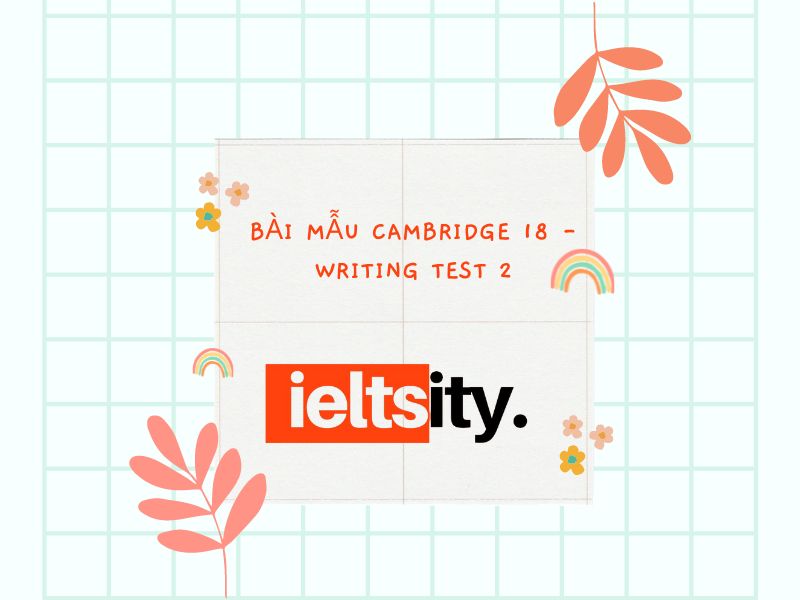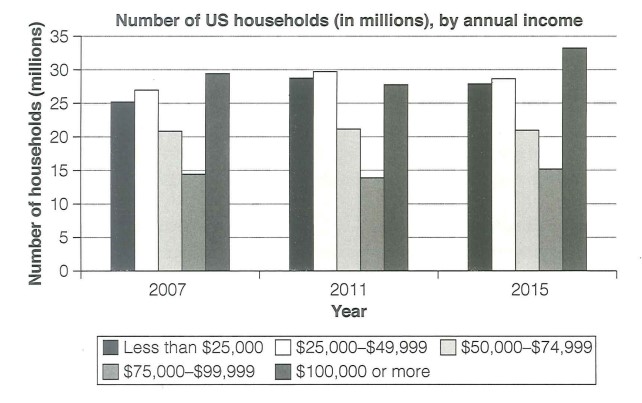Cùng IELTSITY tìm hiểu bài mẫu Ielts Cambridge 18 – Writing test 2 (bao gồm Task 1 và Task 2) ngay nhé!

Writing Task 1: Bar Chart
The bar chart compares the number of households categorized by annual income in the United States in three different years: 2007, 2011, and 2015.

Overall, the number of households in all income brackets did not show any clear trend. Notably, the number of households which made between $75,000 and $99,999 was always the lowest.
Around 25 million families earned less than $25,000 in the US in 2007 and this figure increased slightly to about 29 million in 2011. However, it saw a marginal drop back down to 27 million in 2015. The figure for $25,000-$49,9999 follows a very similar trend, increasing from roughly 26 million to 30 million between 2007 and 2011 then going down to about 28 million in 2015.
It is noticeable that the figure for $50,000-$74,9999 and $75,000-$99,9999 remained relatively unchanged in all three years, hovering around 20 million and 15 million respectively. Lastly, the number of households which had an annual income of more than $100,000 dipped from just under 30 million to around 27 million from 2007 to 2001, before rising considerably to approximately 33 million in 2015.
Writing Task 2:
Some university students want to learn about other subjects in addition to their main subjects. Others believe it is more important to give all their time and attention to studying for a qualification. Discuss both these views and give your own opinion.
| Essay | Useful Language |
| There are two opposing schools of thought1 regarding whether university students should study other subjects outside of their majors or they should focus solely on one single field of study. In this essay, I shall discuss both sides of this controversial issue before going on to state that the right decision depends on the career path that each student chooses to follow after they have completed their studies.
Proponents of multidisciplinary2 study often stress that by learning a wide range of subjects, students can gain different unique perspectives on an issue, enhancing their critical thinking3 and creative problem solving ability. This is particularly useful in today’s world where there are a host of exigent4 multi-dimensional problems, such as climate change or systematic racism. Students engaging in interdisciplinary studies are more likely to become experts who can grasp the complexity of these challenges and devise5 viable solutions for them. Furthermore, there are subjects, such as Statistics or Data Analysis, which can find application in many different fields so students who supplement their majors with these courses can significantly improve their job prospects6 in the future.
However, many students still believe that it is better to devote all of their time and effort to focus on one single area of study. For students who go to school to learn a trade or become qualified in a specific profession, such as those who attend law school or medical school, it is more reasonable to only focus on their majors. Having a breadth of knowledge7 is less valued in their careers and spending time on this can prolong8 the time it takes them to get their qualifications, increasing the cost of their education. In these instances, students are better off fully committing and trying to gain specific expertise9 in one field in as little time as possible.
In conclusion, I believe that students who are going into fields that highly value specific expertise should only focus on their majors but for many other students, it will be more beneficial to study across different disciplines as it allows them to have a more nuanced10 understanding of today’s issues and greatly boost their employability. |
1. school of thought (n): luồng suy nghĩ
2. multidisciplinary (adj): đa ngành, liên ngành
3. critical thinking (n): suy nghĩ đa chiều, tư duy phản biện
4. exigent (adj): cấp bách, khẩn cấp
5. devise (v): đưa ra, lên kế hoạch cho việc gì đó
6. job prospect (n): cơ hội việc làm
7. a breadth of knowledge (phrase): sự hiểu biết rộng, có nhiều kiến thức ở nhiều lĩnh vực
8. prolong (v): kéo dài
9. expertise (n): chuyên môn
10. nuanced (adj): sâu sắc, tinh tế |
Xem Thêm:








